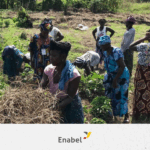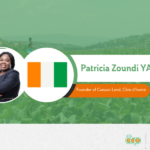Digital technology and strategic partnerships for vocational training in sustainable agriculture
- 29/01/2024
- Posted by: Sandra Borma
- Category: News

Highlighting the IPPC (FAO) COLEAD collaboration in SPS e-learning.
The International Plant Protection Convention (IPPC) is a multilateral treaty for international cooperation in plant protection. The Convention has 182 signatories. Countries wishing to become contracting parties to the IPPC should send their instruments of accession to the Director-General of the FAO.
The IPPC aims to ensure coordinated and effective action to prevent and control the introduction and spread of organisms harmful to plants and plant products. This is achieved through the development and implementation of phytosanitary policies and activities. At a national level, these activities are the responsibility of the National Plant Protection Organisation (NPPO), which is the official service established by a government to carry out the functions specified by the IPPC. While the NPPO is responsible for phytosanitary actions, it cannot operate in isolation and must engage with other government agencies, the private sector and civil society to protect plant health.
On 19 November 2021, a Memorandum of Understanding was signed between COLEAD and the IPPC Secretariat, in the context of the implementation of the FFM SPS programme. This new partnership has strengthened collaborative actions in the field of plant health to minimise the impact of plant pests and facilitate trade, development and economic growth. Below is a non-exhaustive summary of the joint actions carried out over the last 3 years:
- Members of the COLEAD technical team have been selected as members of 3 working groups coordinated by the IPPC Secretariat. These are the IPPC Working Group to develop e-learning materials on monitoring and reporting requirements, the IPPC Working Group to develop e-learning materials on inspection and the Capacity Building Committee team on Fusarium oxysporum sp. cubense Tropical Race 4 (TR4).
- Since then, these groups have been working on the development of training and guidance documents covering inspection, pest surveillance and Fusarium head blight (TR4) in collaboration with the FAO e-Learning Academy. For example, online courses on PRA (Pest Risk Analysis) and export certification have been developed as part of the FAO’s support for the COMESA” trade facilitation programme and support the implementation of the International Standard for Phytosanitary Measures (ISPM).
- NPPOs from ACP countries are supported each year as part of their participation in the IPPC’s Commission on Phytosanitary Measures (CMP). In 2023 the following NPPOs were involved: Burkina Faso; Ethiopia; Ghana; Kenya; Gambia; Togo; Madagascar; Nigeria.
- COLEAD has translated several IPPC guides into French to make them more accessible worldwide, particularly for French-speaking West African countries. The topics covered are :
- The situation of a harmful organism
- The creation of a National Plant Protection Organisation
- How a National Plant Protection Organisation works
- Verification of imports
- Export certification
- Communication on plant health risks
- Managing stakeholder relations
- Plant health diagnosis services
- Monitoring harmful organisms
- Drawing up contingency plans in the event of outbreaks of quarantine pests (new)
- Regulation of wood packaging materials (new)
- COLEAD and the IPPC also collaborate closely and regularly on the co-development of e-learning and the organisation of international webinars. Here are some examples:
- Pest risk analysis (246 participants, 74 countries)
- Export certification (110 participants, 22 countries)
- Phytosanitary inspection (Eng; Sp): (228 participants; 65 countries)
With regard more specifically to digital training, we would like to pay tribute to the ongoing efforts of our colleagues: David SODADE in leading and improving online training courses, Morag WEBB and Marie Hélène KESTEMONT who received their certificate of appreciation from the IPPC, for their contribution in terms of guidance and online training on respectively the prevention, preparation and response to fusarium head blight of tropical race 4 (TR4) of banana, plant health inspection/Surveillance and reporting obligations.
Plant health stands at the intersection of several key global challenges. It is crucial for enabling market access and thus plays a significant role in the agricultural economy and worldwide food security. It is also closely tied to biodiversity preservation, vital for sustaining ecosystem balance and resilience against environmental disruptions. In the era of climate change, managing plant health becomes even more critical. It helps in combating climate change impacts by ensuring the well-being of forests and crops and adjusting to emerging threats in a shifting climate. Plant health is therefore a cornerstone of a sustainable future, intertwining economic, ecological, and natural resource management aspects in a global and integrated perspective.
This activity is supported by the Fit For Market Plus (FFM+) programme, implemented by COLEAD within the Framework of Development Cooperation between the Organisation of African, Caribbean and Pacific States (OACPS) and the European Union. This publication receives financial support from the European Union and the OACPS. The content of this publication is the sole responsibility of COLEAD and can in no way be taken to reflect the views of the European Union or the OACPS.





